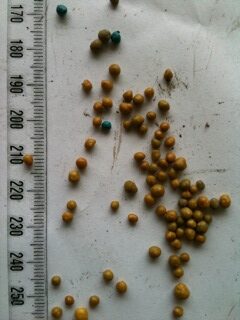50% Off First Application¹
Call 1-855-940-1479
and connect with a TruGreen consultant
The Best Fertilizers For Your Lawn
You can’t have a healthy lawn without a proper fertilization schedule. Timing is important when creating a custom fertilization schedule for your lawn, but even timing is not as important as selecting the correct type of fertilizer for your lawn. Fertilizers are broken down into two main categories: Liquid and granular. The one that is best for you depends on the unique conditions found in your yard.
Granular fertilizer
Granular fertilizer is sold in a solid form that is then added to your lawn while it is dry. Upon watering the lawn, fertilizer beings to sink into the soil and starts to feed your soil. Granular fertilizers are available in two varieties:
- Water soluble nitrogen fertilizers (also known as quick-release formulas) last up to a month, sometimes less depending on heat and rainfall conditions in your area. This is the most commonly used fertilizer in farm environments.
- Water insoluble nitrogen fertilizers (or slow-release formulas) last anywhere from 8 to 12 weeks. The difference in re-application time depends on whether the formula is sulfur or polymer based.
There are many methods for applying granular fertilizer, but the easiest way to achieve equal distribution throughout your lawn involves using a tool designed for spreading seeds, fertilizer and other lawn treatments. These spreaders vary in price depending on your needs, they range from affordable hand-crank spreaders to wheelbarrow-based mechanisms known as drop spreaders.

Liquid fertilizer
Liquid fertilizers reach the soil and start working much faster than granular varieties. These liquid treatments reach the soil very quickly, so you’ll need to apply them more often than is required with granular treatments. Liquid fertilizers also tend to be a harder to evenly apply than granular products, so follow the directions found on the package very carefully. Since they work so quickly, most liquid fertilizers require reapplication every two to three weeks.
Fertilization tips
For the ideal results keep the following suggestions in mind when applying lawn fertilizer:
- Always water your lawn following fertilizer application.
- In summer months avoid adding fertilizer during the hottest parts of the day.
- Take time to research your lawn’s needs before selecting a fertilizer. Almost all lawns benefit from nitrogen-based treatments, but individual factors indicate the proper amount of nitrogen required for your lawn’s optimal health.
- Clean up any extra fertilizer that may spill during application. Failing to do so could lead to over-fertilized sections.
Organic fertilizers
A growing number of homeowners prefer to use organic fertilizers in their lawn instead of chemical-based treatments. Unlike chemical fertilizers, organic treatments are not targeted to reach the root-zone quickly so you may have a harder time finding success with these products. Many of these products are animal based and work very well despite their differences from non-organic treatments. Some of the most commonly used organic fertilizers include manure, seaweed, fish emulsion, blood meal and bone meal.
Making your own organic fertilizer
Organic lawn fertilizers are also available in both liquid and granular varieties. You can even make your own organic fertilizer by buying the components individually and applying only the ones that your lawn requires. The most common type of homemade liquid treatment is known as compost tea and requires just mature compost and water. Combine the two and mix it daily for one week. Once a week has passed you can strain the mixture and apply it directly to your lawn. This type of treatment is much more gentle than other types of fertilizers and can be added at just about any time.

TruGreen will gladly visit your property as often as needed between scheduled visits to make any necessary adjustments and to ensure your satisfaction.
Getting Started with TruGreen
- Call or fill out the form above to reach a lawn care specialist.
- Know the square footage of your yard, as well as any specific areas of concern.
- With the help of your specialist, create a customized lawn care plan that meets your lawn’s needs.
- Schedule your Healthy Lawn Analysis2 to start your service.
